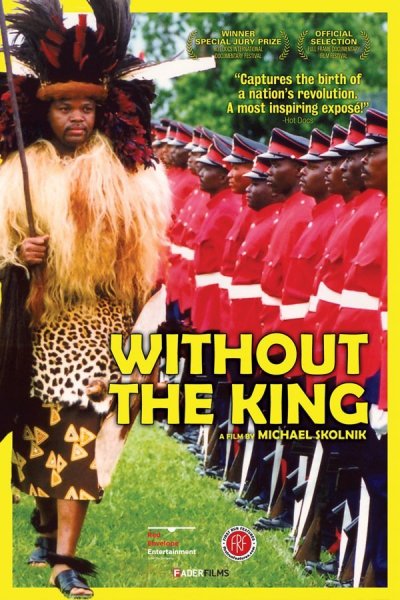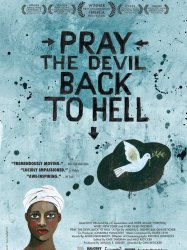Without the King is a film of genre Documentary released in USA on 13 april 2007
Without the King (2007)

If you like this film, let us know!
Released in USA 13 april 2007
Length 1h23
Genres Documentary
Themes Films set in Africa, Documentaire sur une personnalité, Documentary films about politics, Political films, Films about royalty
Rating67%










Without the King is a 2007 documentary film by Michael Skolnik, an American filmmaker. It follows problems of Swaziland, a landlocked country in southern Africa.
The film features Mswati III, the king of Swaziland, and his heiress and self claimed rapper Princess Sikhanyiso. It shows the angry populace and the country's problems such as a high HIV prevalence, comparing it with the daily life of Mswati III, Africa's last absolute monarch.
Princess Sikhanyiso is critical of the film.
^ Bearak, Barry (2008-09-06). "In Destitute Swaziland, Leader Lives Royally". The New York Times.
^ Scheib, Ronnie (April 23, 2008). "Without the King". Variety. Retrieved May 3, 2014.
^ Ronnie Scheib (2008-04-23). "Without the King". Variety. Retrieved 2013-11-27.
^ Catsoulis, Jeannette (2008-04-25). "Without the King (2007)". The New York Times. Retrieved 2013-11-27.
^ "Swaziland's King of Pain - The New York Sun". Nysun.com. 2008-04-25. Retrieved 2014-05-14.
^ "Pashu :: About this artist on ReverbNation website". Retrieved August 3, 2010.
Comments
Leave comment :
Suggestions of similar film to Without the King
There are 8970 with the same cinematographic genres, 10637 films with the same themes (including 1 films with the same 5 themes than Without the King), to have finally 70 suggestions of similar films.If you liked Without the King, you will probably like those similar films :

The King and the People (2013)
, 53minutesGenres Documentary
Themes Films set in Africa, Documentaire sur une personnalité, Documentary films about politics, Political films, Films about royalty

Monte Carlo: C'est La Rose (1968)
, 1hDirected by Michael Pfleghar
Origin USA
Genres Documentary
Themes Documentaire sur une personnalité, Documentary films about politics, Political films, Films about royalty
Actors Grace Kelly, Françoise Hardy, Terry-Thomas, Gilbert Bécaud, Toni Basil, Anita Mann

Apartheid Did Not Die (1998)
, 51minutesDirected by John Pilger
Genres Documentary
Themes Films set in Africa, Films about racism, Documentary films about racism, Documentary films about law, Documentaire sur une personnalité, Documentary films about politics, Political films
Actors John Pilger
Rating68%






Budrus (2010)
, 1h10Directed by Julia Bacha
Origin USA
Genres Documentary
Themes Films set in Africa, Films about religion, Documentary films about law, Documentary films about war, Documentary films about historical events, Documentaire sur une personnalité, Documentary films about politics, Documentary films about religion, Political films, Films about Jews and Judaism
Rating76%





Jordana Horn in The Jewish Daily Forward states that: Budrus [is] a documentary by Julia Bacha that examines one West Bank town’s reaction to Israel’s construction of the security barrier. The town, with a population of 1,500, was set to be divided and encircled by the barrier, losing 300 acres of land and 3,000 olive trees. These trees were not only critical for economic survival but also sacred to the town’s intergenerational history. The film tells the story of Ayed Morrar, a Palestinian whose work for Fatah had led to five detentions in Israeli jails, but whose momentous strategic decision that the barrier would be best opposed by nonviolent resistance had far-reaching ramifications.
 , 1h25
, 1h25Directed by Nick Broomfield
Genres Documentary
Themes Films set in Africa, Films about racism, Documentary films about racism, Documentary films about law, Documentaire sur une personnalité, Documentary films about politics, Political films
Actors Nick Broomfield
Rating70%





 , 1h
, 1hGenres Documentary
Themes Films set in Africa, Films about religion, Films about terrorism, Documentary films about law, Documentary films about war, Documentary films about historical events, Documentaire sur une personnalité, Documentary films about politics, Documentary films about religion, Documentary films about terrorism, Political films, Films about Jews and Judaism

Checkpoint (2003)
, 1h20Origin Israel
Genres Documentary
Themes Films set in Africa, Films about religion, Documentary films about law, Documentary films about war, Documentary films about historical events, Documentaire sur une personnalité, Documentary films about politics, Documentary films about religion, Political films, Films about Jews and Judaism
Rating77%





Checkpoint is shot in cinéma vérité style with no narration and very little context. Shamir himself is absent from the film except for one scene in which a border guard asks him to try to make him "look good," and Shamir asks how he should do that.

Confrontation at Concordia (2003)
Origin Canada
Genres Documentary
Themes Films set in Africa, Films about religion, Documentary films about law, Documentary films about war, Documentary films about historical events, Documentaire sur une personnalité, Documentary films about politics, Documentary films about religion, Documentary films about cities, Political films, Films about Jews and Judaism
The documentary opens with scenes of the violence at the event, depicting fighting between protesters and Jewish students attempting to enter the venue. This is followed by an interview with student Samir Elitrosh, a leader of the Solidarity for Palestinian Human Rights and the leader of anti-Israel violence who was later suspended. It also features interviews with Concordia's Hillel president Yoni Petel and Concordia rector Frederick Lowy, and concludes with a discussion of what it sees as the growing trend of anti-Israel activities on North American campuses.

Pray the Devil Back to Hell (2008)
, 1h12Origin USA
Genres Documentary
Themes Films set in Africa, Documentary films about war, Documentary films about historical events, Documentaire sur une personnalité, Documentary films about politics, Political films
Rating74%





A group of ordinary women in Liberia, led by Leymah Gbowee, came together to pray for peace. Armed only with white T-shirts and the courage of their convictions, they demanded a resolution to the country’s civil war.

Echoes from a Sombre Empire (1990)
, 1h31Directed by Werner Herzog
Origin German
Genres Documentary
Themes Films set in Africa, Documentaire sur une personnalité, Documentary films about politics, Political films
Actors Werner Herzog
Rating71%





Ce documentaire a pour sujet le président de la République centrafricaine, l'empereur Jean-Bedel Bokassa.
 Connection
Connection